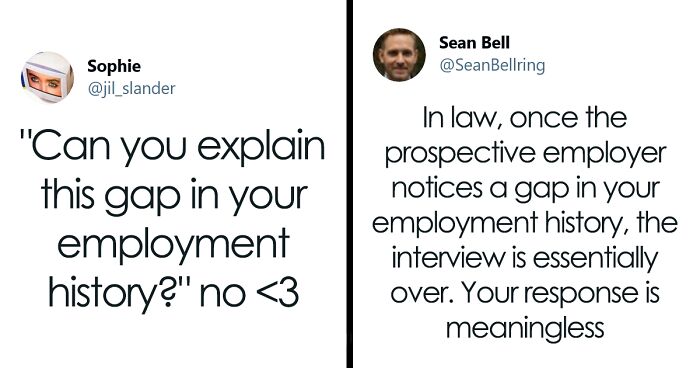
People On Twitter Share “Excuses” For Having A Gap In Their Employment History
Job interviews are some of the most stressful experiences for many of us. On the stress scale, they fit somewhere between actual work and financial problems.
So, having questions that you know might have a huge impact on whether you get the job or not makes the interview process that much more stressful.
But some questions, according to many, shouldn’t even be a thing. Like the ‘where do you see yourself in 5 years’ one. But another thought-provoking question has been making rounds on the internet lately.
More Info: Twitter
A job interview is stressful as it is without questions that make you feel like you have to explain yourself
Image credits: Savannah River Site
A few days ago, web designer and writer Sophie (@jil_slander) went to Twitter to ask people how they would explain the gap in their employment history.
For the most part, many responded with real answers they said or planned to say. Turns out, having a gap in your employment history is quite common, especially during the pandemic, but it’s only one of many reasons.
This Twitter user asked how people explained the gap in their employment history
Image credits: jil_slander
And Twitter delivered
Image credits: SeanBellring
Image credits: TnezRN
Image credits: ApeIsrael
Some said that they took time off to take care of their kids, sick loved ones, or even themselves. Most were actually the latter case—their previous job had drained them so much that it affected their mental health, which demanded time to recuperate.
Others were very honest about what they would say, except they couldn’t really find the words to translate an otherwise personal or even inappropriate piece of information into professional speech.
This included unfortunate situations like being spontaneously “demoted” and being paid less than half of what they were paid as a contractor or, if you’re in law, whatever you respond with will quite likely be a no in getting the job.
Reasons for gaps ranged from having to take care of kids to being screwed over to simply needing some rest
Image credits: EndlessMason
Image credits: BlackshearComic
Image credits: ofdiscontent
Image credits: Zoe10828992
Now, at face value, it looks like an ordinary and even legit question, but most people seem to not really agree with it. In some people’s experience, this is where they quite likely lose points towards getting the job, thus begging the question, what is actually a good answer to it?
We’ve asked our in house HR expert at Bored Panda HQ to elaborate on the question, and he said: “During our interview process, we ignore employment gaps, especially if the person fits or exceeds every other criterion. The question may come up if they mention it themselves.”
Image credits: legalizeNC_
Image credits: DoktorRokk
Image credits: JoelGivan__
Image credits: aridyn
Some are uncomfortable answering it, as they may have used this time to work on their physical health, which, if they disclose that during an interview, makes the interviewer feel uncomfortable for even asking.
Others were simply finding it hard to get employed because things like racism, sexism, and ageism are a thing. Even being unlucky may have an impact on this.
And all of this adds to the fear that these answers can be interpreted in a bad way, and hence they don’t land the job.
Some shared reasons that can’t be easily put into words
Image credits: supermochiiiii
Image credits: trcovell
Image credits: sanitysannex
Image credits: sarashornyacct
“Asking this question doesn’t really lead to an answer that would expose red flags or other key information about a person,” elaborated HR Panda. “A gap in a resume can mean anything: maybe they took time off to rest, or perhaps they worked something they aren’t proud of, or did something that didn’t work out. And that doesn’t change their chances of getting the job.”
“What matters, however, is that they have their priorities straight, they have a clear picture of what they want from this job, and they want to advance their careers.”
Image credits: BlackBeltJaxson
Some online begged the question why do employers even care about this gap?
Image credits: COD Newsroom
Image credits: bigbangbri
There were even people working in the industry, saying that this question shouldn’t be a thing
Image credits: Kathlee93516724
Image credits: luvmaila
We’ve asked our HR expert what questions are more important than the above in an interview process, and he had this to say: “‘What do you want?’ We think it’s very important to find out what the applicant really wants from this job, and whether they will still love working here after 6 or 12 months. Our job, as recruiters, is to identify their talents, skills, abilities, and whether their drive is real.”
On Twitter, however, many didn’t agree with the question, and even some who work with employment were arguing that such questions don’t really matter in many if not all cases, sparking a debate. Oh, and, of course there was the occasional joker who channeled their inner self in answering the question.
Image credits: elbowwater
Image credits: latenightstefon
Image credits: tenfour2
Image credits: mxmrdr
Image credits: JPollocksNo5
Lastly, we’ve asked HR Panda to share the biggest piece of advice for those who are preparing for interviews: “Be yourself. I know this sounds super cliche, but it’s true. Many come to interviews ready to fit in and be what their managers want them to be, but that’s the worst thing you can do. Nobody should hide behind masks.”
He continued: “Instead, candidates should remain open about their strengths as well as their weaknesses, so that both sides can determine whether they’ll actually like it here and whether they will be right for the job. Nobody really wins in a situation where a person lies on their resume or interview and continues to work here, having to constantly cover all of those lies.”
And because this is the internet, of course there were some jokers who gave creative answers
Image credits: ruby_danger
Image credits: _aDiLo_
Image credits: C_64
Image credits: magskinbag
Image credits: Em0nTw1tter
The tweet engaged many online, garnering nearly 300,000 likes with over 26,000 retweets in just two days. You can read the whole thread here, but before you do that, let us know your thoughts on this in the comment section below! And if you want more, we already covered a similar discussion in another article on the gap in employment history.
128Kviews
Share on FacebookI had a 20 year gap in my employment. When asked I said "My son was diagnosed with autism and I wanted to give him the best chance of being independent. Also, it would not have been fair to employers to have to take as much time off as was required to meet all of my son's needs. Now that he's grown and I have more help, this is no longer and issue." Usually it's enough to raise an eyebrow, but I usually get an "atta girl" for being committed to raising him.
Same for my wife, she is a full time mum, she was going to go back to work but then he was diagnosed as autistic a couple of years ago so her time is spent raising and teaching him to be independent as possible, organising his therapies. Even though he is only 6 it is best to start early as possible in our view so that knowledge is in his head.
Load More Replies...out of all the times I've hired, I have never even bothered to look and see if there were gaps in the first place. I don't care. When looking at a resume, I just want to see if they have relevant experience.
Same here. I don’t even look at the dates really. Who gives a shít. I don’t want to know these people, I just want to pay them to do stuff.
Load More Replies...The question about why someone had a gap is irrelevant from a hiring standpoint. If it was something shady a background check will turn it up. If they were fired a call to their previous job will show that. Most of the time it's going to be something like kids, illness or death in the family. I know a lot of people make up stories because they think the real reason they have a gap would be embarrassing or difficult to explain. Why should they have to explain it though? To me what matters is what they did during that time to keep their skills sharp. I care that during that time they kept up with the industry, and have practiced their skills to get them ready for the positions they are applying for. So I ask them what they did during that gap to be ready for this interview. 100% relevant without putting a person on the spot. If they want to tell their story as part of that, cool. They shouldn't have to though.
I think your way of handling work gaps is fabulous and spot on!
Load More Replies...I had a 20 year gap in my employment. When asked I said "My son was diagnosed with autism and I wanted to give him the best chance of being independent. Also, it would not have been fair to employers to have to take as much time off as was required to meet all of my son's needs. Now that he's grown and I have more help, this is no longer and issue." Usually it's enough to raise an eyebrow, but I usually get an "atta girl" for being committed to raising him.
Same for my wife, she is a full time mum, she was going to go back to work but then he was diagnosed as autistic a couple of years ago so her time is spent raising and teaching him to be independent as possible, organising his therapies. Even though he is only 6 it is best to start early as possible in our view so that knowledge is in his head.
Load More Replies...out of all the times I've hired, I have never even bothered to look and see if there were gaps in the first place. I don't care. When looking at a resume, I just want to see if they have relevant experience.
Same here. I don’t even look at the dates really. Who gives a shít. I don’t want to know these people, I just want to pay them to do stuff.
Load More Replies...The question about why someone had a gap is irrelevant from a hiring standpoint. If it was something shady a background check will turn it up. If they were fired a call to their previous job will show that. Most of the time it's going to be something like kids, illness or death in the family. I know a lot of people make up stories because they think the real reason they have a gap would be embarrassing or difficult to explain. Why should they have to explain it though? To me what matters is what they did during that time to keep their skills sharp. I care that during that time they kept up with the industry, and have practiced their skills to get them ready for the positions they are applying for. So I ask them what they did during that gap to be ready for this interview. 100% relevant without putting a person on the spot. If they want to tell their story as part of that, cool. They shouldn't have to though.
I think your way of handling work gaps is fabulous and spot on!
Load More Replies...
 Dark Mode
Dark Mode 

 No fees, cancel anytime
No fees, cancel anytime 







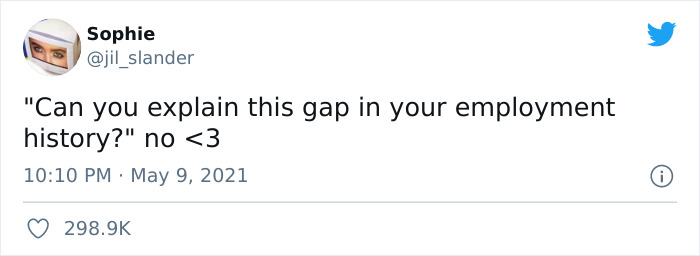
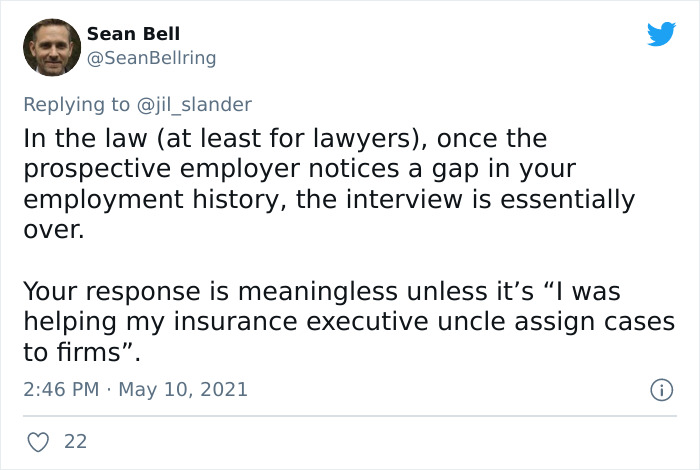
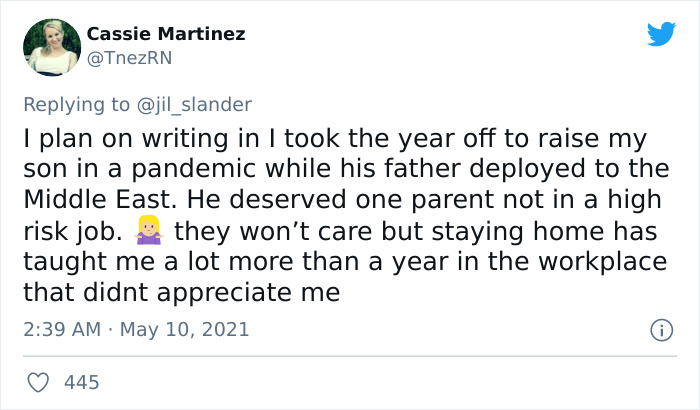

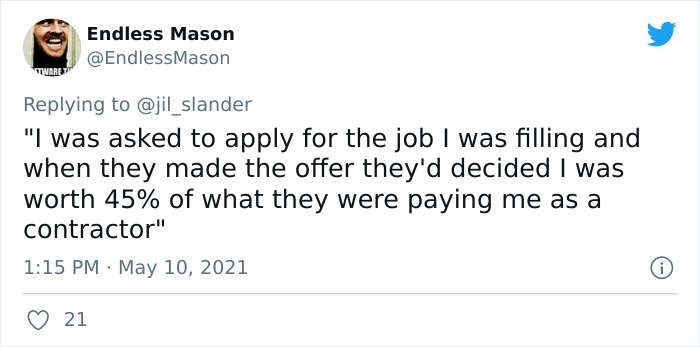
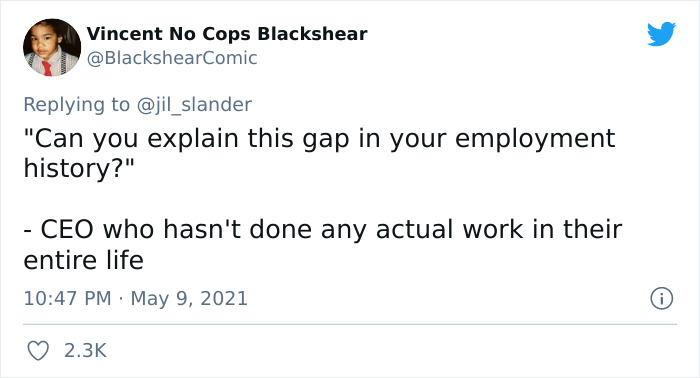
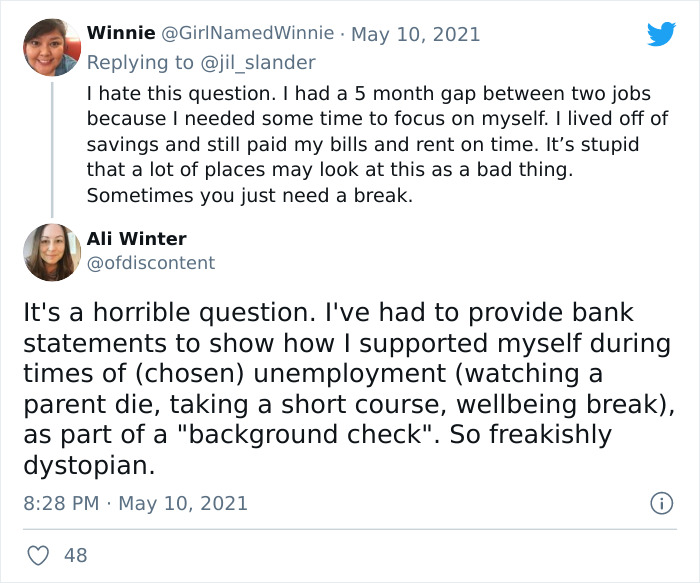

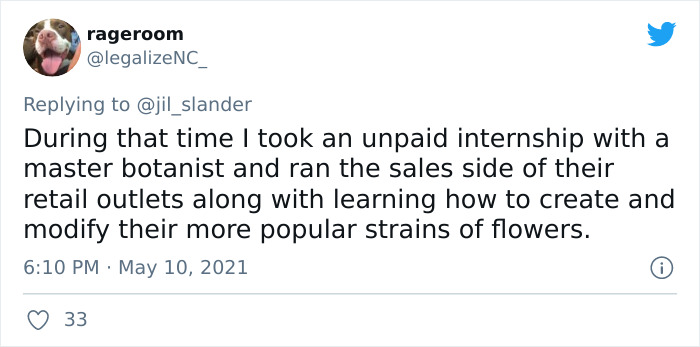
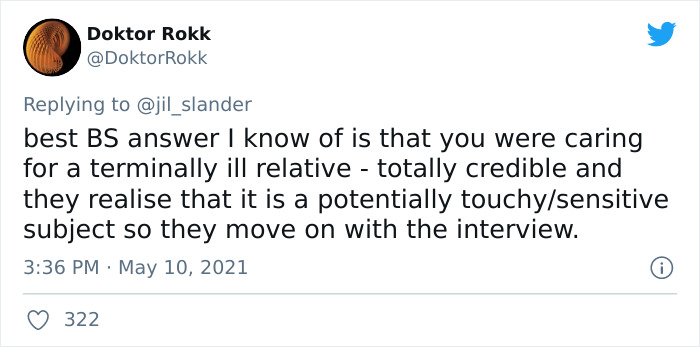
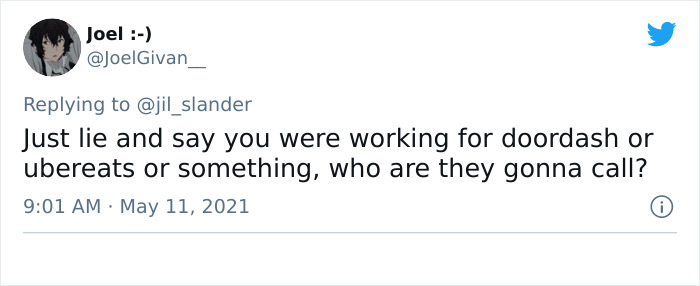
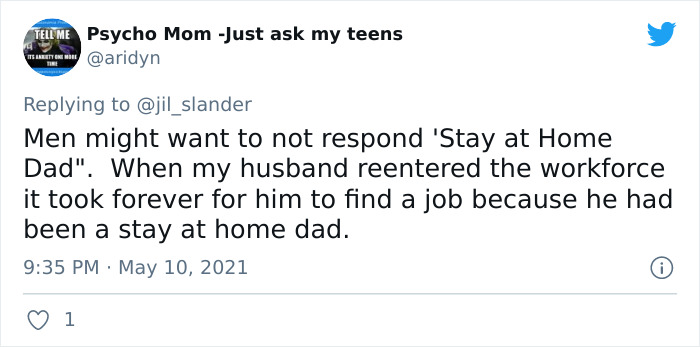
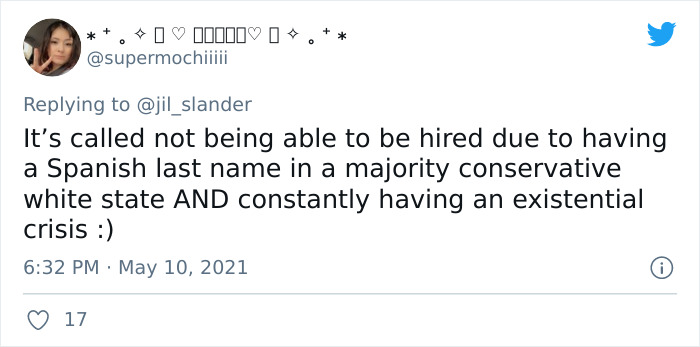
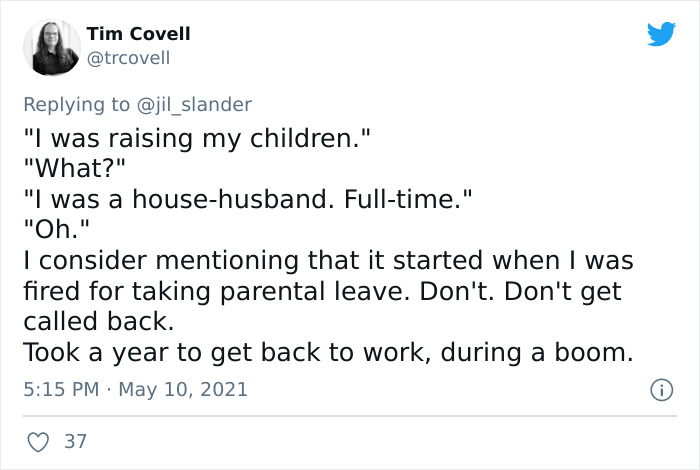
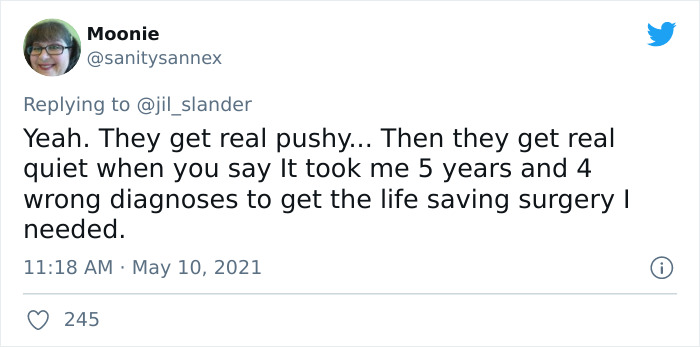
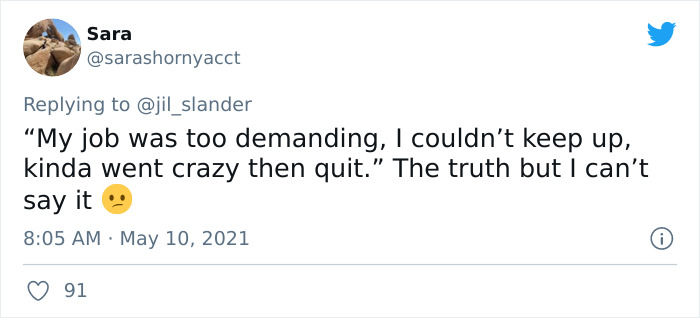
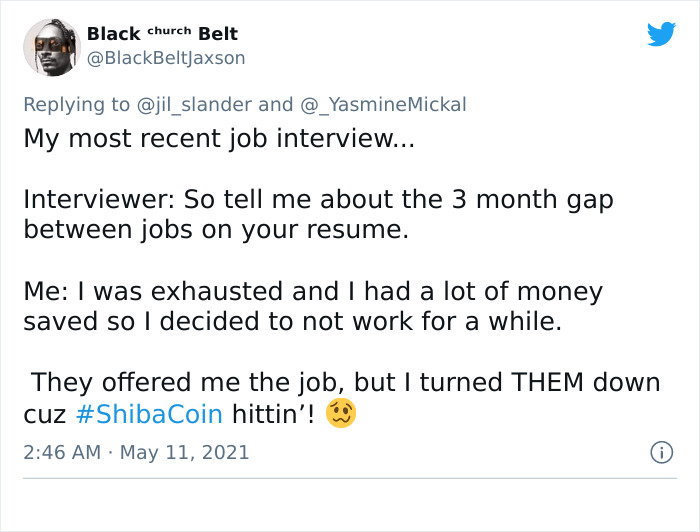
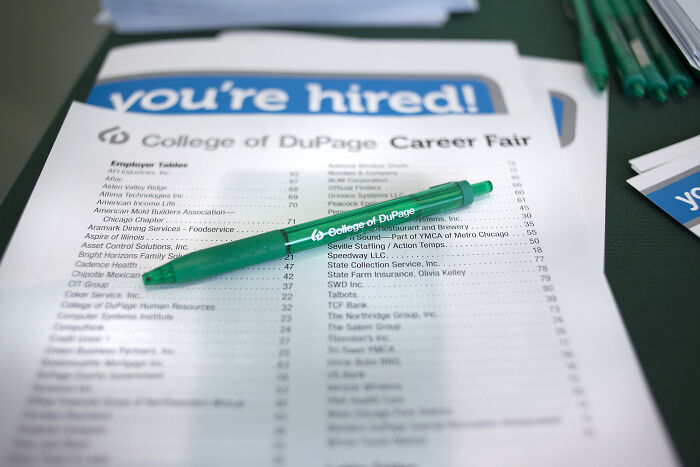
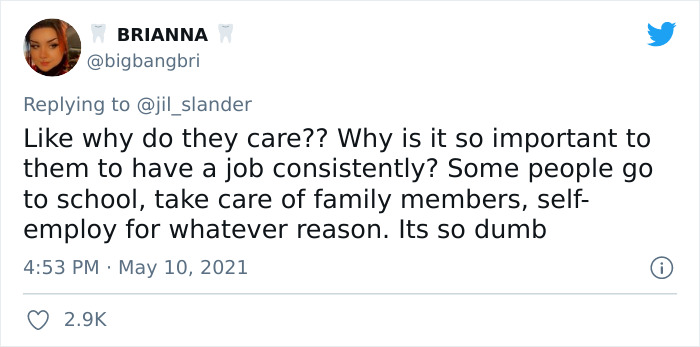
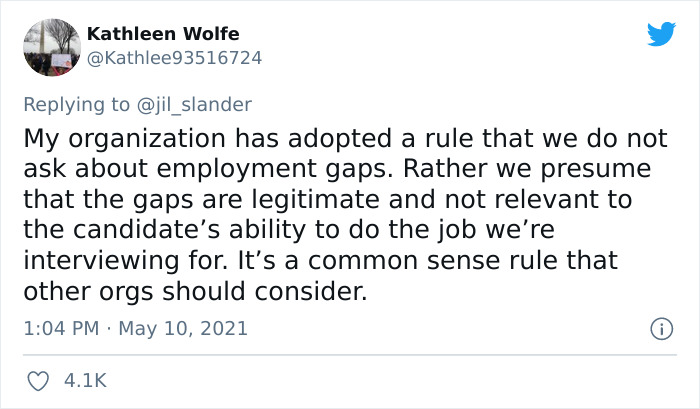
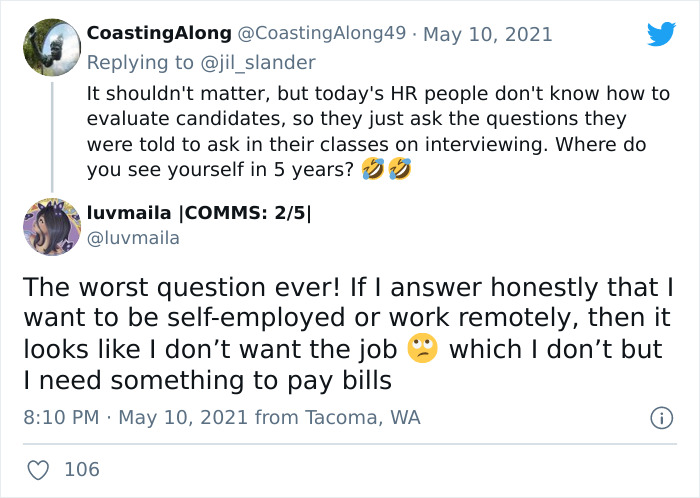
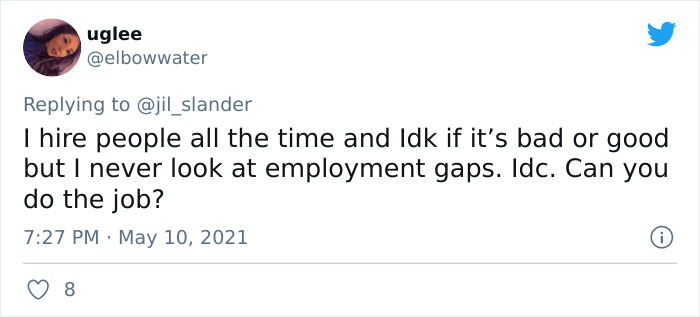
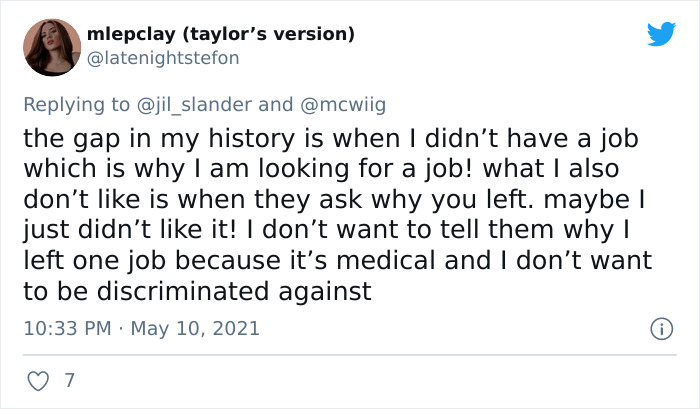
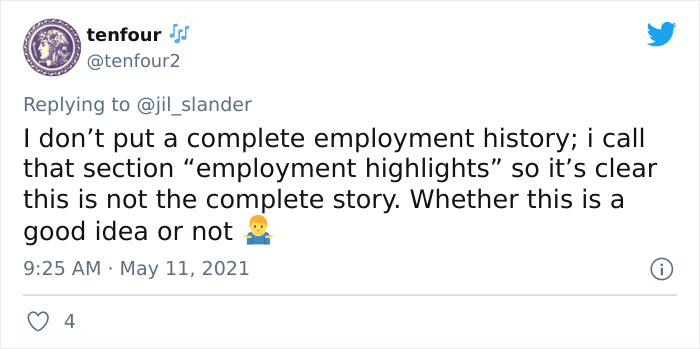
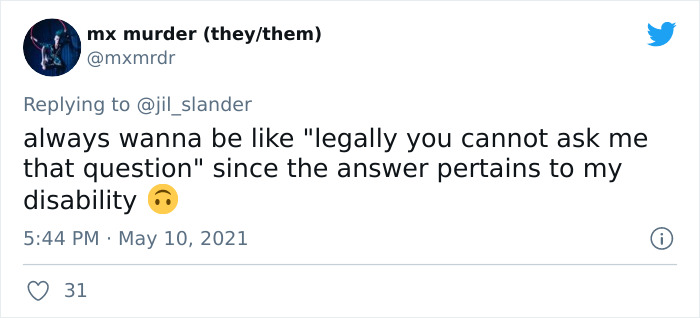
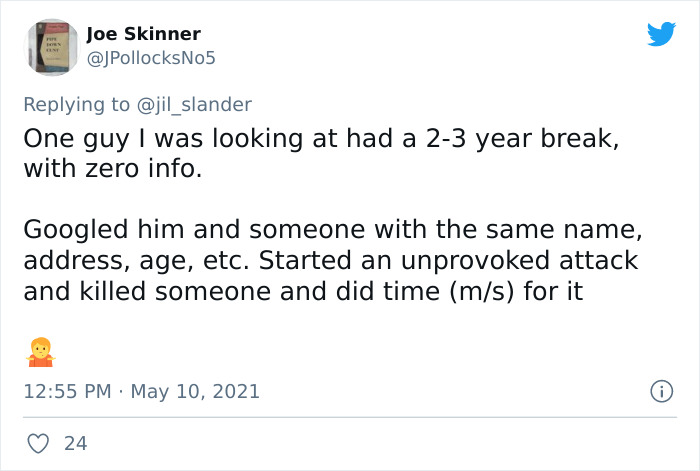
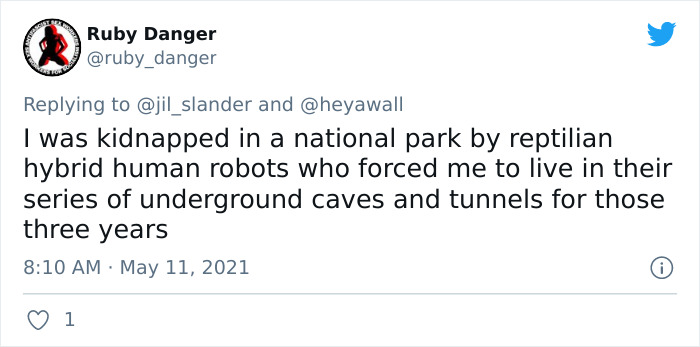

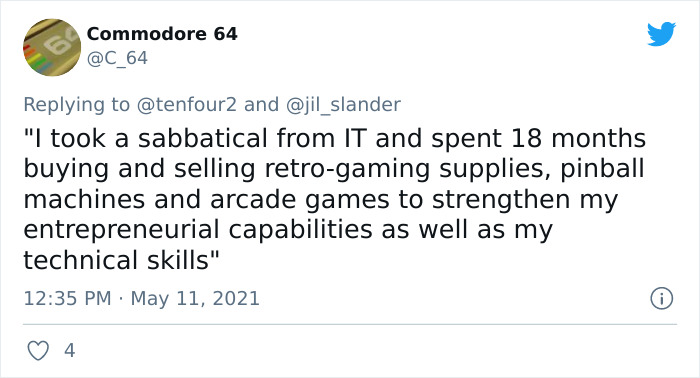
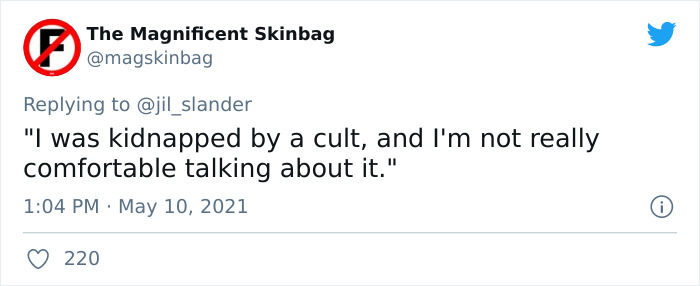
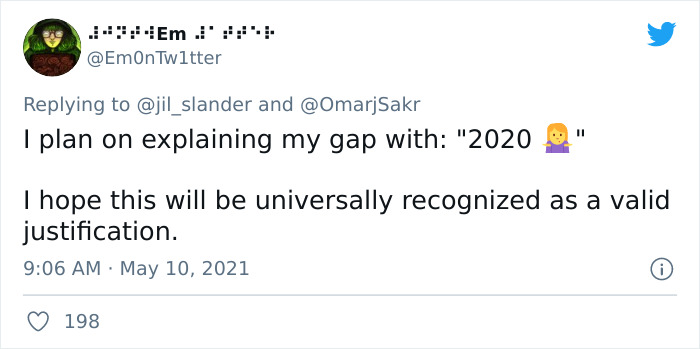










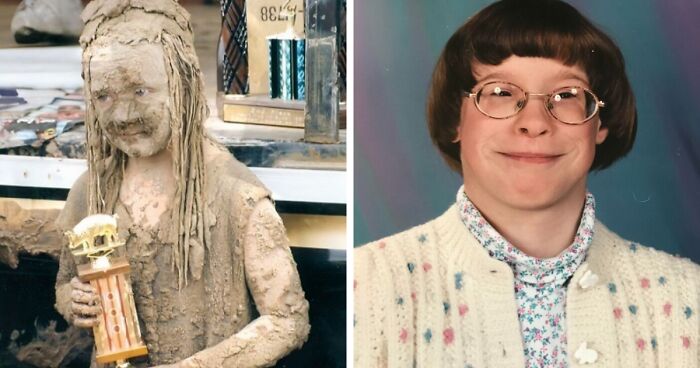

































143
74